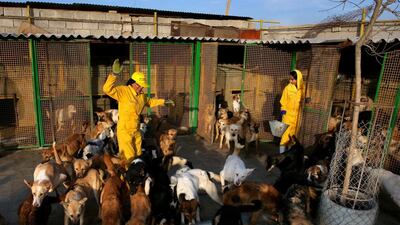TEHRAN // Man’s best friend is seen as anything but in Iran, where city workers shoot down strays and conservatives view pet dogs as a corrupting Western influence.
But in a rare animal shelter in the countryside west of Tehran, hundreds of lucky pups have found mercy — and a growing number of Iranians are learning to love them.
In the Islamic republic, dog ownership is seen as a pernicious Western import, and conservative lawmakers have called for it to be banned or at least heavily restricted, in line with other regulations governing Western music and fashion.
But outside Tehran, more than 500 dogs find care and affection at the Vafa Animal Shelter, which was established through an endowment in 2004. It is the country’s only licensed animal refuge.
“In our society, dogs are the most vulnerable animals,” said Ali Sani, the shelter’s manager. “The dogs that are brought here used to be in urban environments and were struggling with problems and needed help.”
The shelter rescues stray dogs, who otherwise risk being shot and disposed of by municipal workers.
But pet dogs do not have it much better either.
Dog-walking in public is banned, as is allowing dogs to stick their heads out of car windows. Around 30 lawmakers have signed onto a draft bill to punish dog-walkers with up to Dh11,000 in fines and 74 lashes, but a similar previous attempt failed.
The dispute over dogs is part of a culture war in Iran that dates back to the revolution in 1979 that toppled the pro-Western shah.
Conservatives have sought to impose their version of Islam on society and rid it of Western influence. But their efforts have met with resistance, particularly from younger, more urban and more well-off Iranians — the demographic of dog owners — who helped elect President Hassan Rouhani, a relative moderate, last year.
“Dog owners sometimes bring them to public, in buses for example, or let the dog stick its head out of a car window to show it to others. That is unacceptable,” said Mohammad Ismail Kowsari, one of the parliamentarians supporting stiffer penalties.
“What made us consider drawing up such a bill was the increasing number of those who exhibit dogs by walking them in public.”
Mr Kowsari said, however, that the mere ownership of a dog would not be criminalised, as long as it is kept indoors.
The shelter has steered clear of the debate, and does not promote dog-walking. Mr Sani said authorities have generally been supportive of the shelter’s work, in part because it gathers up strays and spays and neuters them.
Home Rashid, a dog groomer, said the shelter relies on volunteers and private donors — which can be a hard sell at a time of crippling international sanctions over Tehran’s nuclear programme.
“We try to convince people to donate, but unfortunately talking them into helping this shelter is a very difficult job, because most of them say as long as there are human beings that need help, why should they help dogs?”
The shelter also struggles to find homes for dogs, with only around six being adopted each month.
Iranians, like many other prospective dog owners, prefer purebreds to strays, something the shelter is trying to change.
“We want to show people that those homeless dogs that they see in streets and alleyways can be our best friends,” said Afsaneh Zarrin, who is in charge of adoptions.
Mahtab Zeinali, 20, another volunteer, dreams of a day when dogs in Tehran will not be confined to private homes, security checkpoints and guard duty.
“I think it would be great if there were a place where dogs could play with each other; a place exclusively for dog owners to walk their pets,” she said as she cuddled her pug, William, at home.
* Associated Press

